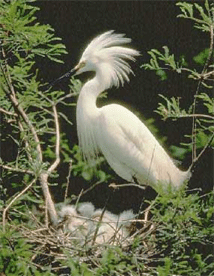 |
Snowy Egret
Photo from U.S. Fish and Wildlife Service
Southern New England - NY Bight Coastal Ecosystems Program |
The Vedders were a family of Dutch ancestry who lived in Branford, Connecticut on the end of Pleasant Point. Pleasant Point is "Vedder's Point" on old maps. It should revert to its proper name. Let me tell you why: Jennie Vedder spent most of her adult life as a schoolteacher in New York, completely unknown and unregarded. For four decades, she secretly hoarded her meager salary. When she retired, she returned to Branford, bought the marshland on the other side of Pleasant Point, and deeded it to the Town of Branford in perpetuity. It is now a rich sanctuary for wildlife and enjoyed by thousands of people every year.
This amazing act of philanthropy was in stunning disproportion to Jennie Vedder's means. In fact, it can be fairly said that she sacrificed throughout her life to make it. She had no ulterior agenda, and received neither wealth nor accolade as a result. She simply died, and left us her marsh as a gift forever. Yet, not a single street in Branford bears her name.
Page created on 7/18/2005 12:00:00 AM
Last edited 1/5/2017 9:33:14 PM
Related Links
Branford Land Trust
- This non-profit organization works to preserve open space in Branford and to protect the region's natural resources by acquiring open space, promoting education about natural resources and encouraging community involvement.
Extra Info
Gwyn Ballard wrote the following tribute to Earthkeeper Heroine Jennie Vedder:
As dawn brightens, I leave the path well trod,
On iron gratings ford a muddy stream,
And find myself in silent wonderment
Upon a pink-hued slab of rock, gazing
Across the panorama she preserved for me:
Ahead, the low-tide marshes, featureless
Fog-filled drainages transecting them.
To right, the stand of oaks that circumscribes
The northward view. To left, a causeway,
And ghosts of islands, dim in the sea-haze.
At once, a solitary voice cries out, a bobolink,
The first awake and still a’nest, but warbling
Full throated in the dew-soft air. My heart
Leaps up, replies, but quietly, lest I awake
A nearby Sleeping Beauty from her dreams.
Soon, as if by some divine command, or stroke
Of Nature’s downward-swept baton, twitterings
Of sound begin, at first but few, then more
By minute more, until the tuneless orchestra
Of songbirds swells forth, the dawn chorus.
I sit down on the lichen’d stone, coarse-fleshed
And crystalline, listen to the conversation
Of those living instruments. “It’s me!”.
“Haw, Haw!” “It’s me!” “So what!” “It’s me!”
Swallows zig-zag like small grey darts,
Catching insects. “Brrrrrrdokdok!” comments
A woodpecker. “Drrrrrrrrrdokdokdok!”
A pair of mallards paddle past, dibbling weed;
A flight of geese aloft, honking. An egret lands.
Another. Yes, God is in His heaven here.
Behind me, hidden by the promontory’s brow,
The late-May sun comes up. Its orange rays
Stroke tops of trees beyond the marsh
Then light their lower boughs and move
With silent stealth across the tussock’d grass
Toward my pedestal, mottling the ground
With ruddy hues admixed with green, tinting
The sun-bleached grays of driftwood baulks,
And the silver swirls of the morning mist,
And the cocoa brown of the drainage channels.
From my perch, I drift away, a bird myself,
Loosed from the bonds of gravity. Air streaks
Past my wings; I sculpt it to my bidding,
This way and that, arcs and curves, trajectories
That know no sense of limitation, only power.
I must be careful not to stray, transgress
The boundaries pertaining here. The ospreys
Are awake now, with hungry chicks to feed;
A noble end for any prey but nonetheless
The wasted words of a poem not completed.
I follow a channel, serpentine as the meanders
Of the Mississippi, beneath the bridge
Into the bay, opposite the Thimble Islands.
Several are distinct now, floating stately
As galleons at anchor. The closest barque
Sports a beautiful field-stone house,
Tile roof’d, part Dutch, not mansarded,
Hut of some wealthy Robinson Crusoe;
North of it, a steam-tramp, grey-shingle
Hulled, and masted with six poplars.
The flagship of the fleet lies beyond, daring
Stormier water. Upon its deck, a Tudor house,
Gorgeously proportioned and constructed,
Stands in landscaped gardens. I admire it,
Glide above its chimney pots and balconies,
Think how grand it would be, to live there.
No matter! I wheel into the warming wind,
Flap across some tide-stained basalt slabs
Cacophonous with seagulls’ squabblings,
Then Buchanan’s barges, and back to my loft.
The male osprey is absent now, fishing the bay –
Or so his mate believes. But I have seen him,
Perched upon a fallen tree, doing nothing
But watch me with his keen, yellow-iris’d eyes.
His spouse is comfortable - she has her babies,
Nest in good repair, a reliable provider:
No need to work all the time, surely? I think
Upon these ordinary things, and give thanks
To the woman whose love and foresight
Kept them alive here: A Heroine, Jennie Vedder.
Gwyn Ballard
June 2003
NOTE: “The closest barque” is Lewis Island. The “more modest ship” to its east is Belden Island. The “flagship of the fleet” is Rogers Island.

